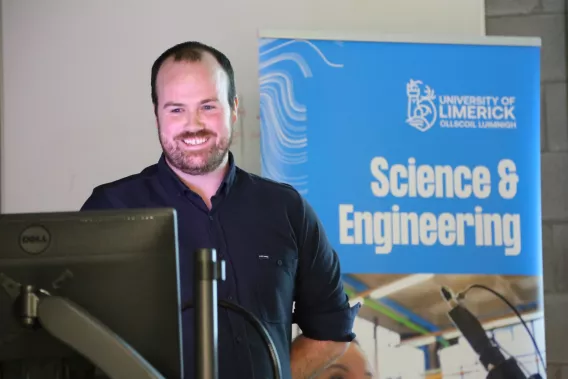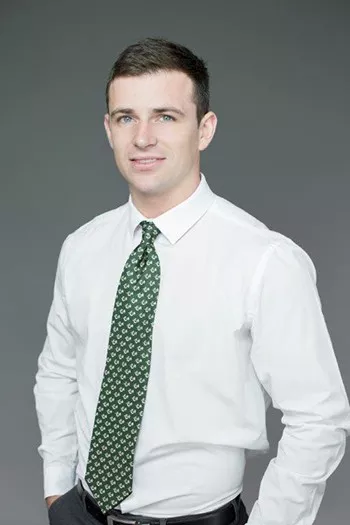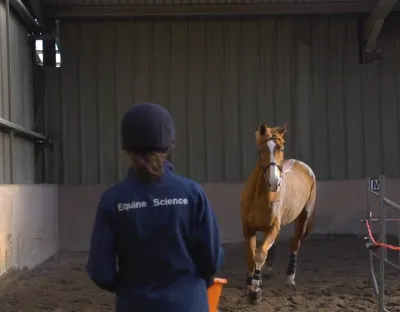Key Info
Bachelor of Science in Equine Science
Equine science is a specialization within animal science, which involves the study of the reproduction, physiology, behavior and nutrition of horses.
Would you like to follow a professional career in the horse industry? The four-year BSc degree in Equine Science provides you with the opportunity to underpin your career aspirations with specialist knowledge and skills. This programme, unique in Europe, has been developed because of the economic importance of the horse and related industries and the consequential need to produce highly qualified personnel with the specialised knowledge to exploit the potential of these industries.
The overall aim of the programme is to equip you with degree-level competence in the disciplines of Equine Science and a choice of professional studies in either Equitation* (the art or practice of horse riding or horsemanship) or Equine Business Management. Graduates of the programme contribute to the continued development of the horse industry through the application of their knowledge, skills and research in Science, Equitation and Business Management.
* Entry to the Equitation Science option is dependent on achieving a satisfactory standard in Equitation Science over the first two years.
This course provides students with both skills and knowledge that can be applied to many different areas within the equine industry and beyond.
- Sean Flannery, Graduate
Learn more about our courses and upcoming events
What you will study
The programme is four years in duration with two semesters per academic year. There is also a period of work placement.
Years 1 & 2
All students undertake common modules for the first two years providing a strong base in science. You will take modules in Anatomy and Physiology, Feeding and Behaviour, Reproduction, Health and Disease, and Nutrition. In addition, a strong base in business is established with modules in Economics, Marketing and Accounting.
All students take modules in Equitation in the first two years. These modules involve horse riding and hands-on working with horses.
| Semester 1 | |
|---|---|
| BY4001 | Biology 1 |
| CH4701 | General Chemistry 1 |
| EC4111 | Microeconomics (Non Business) |
| EQ4051 | Introduction To Horsemanship |
| EV4012 | Equine Anatomy & Physiology |
| Semester 2 | |
|---|---|
| BY4002 | Biology 2 |
| EC4112 | Macroeconomics (for non-business) |
| EQ4032 | Equestrian Skill Analysis |
| EV4032 | The Horse Industry |
| EV4042 | Equine Reproduction |
| Semester 3 | |
|---|---|
| EQ4013 | Foundations Of Equine Locomotion |
| EV4003 | Equine Feeding & Behaviour |
| EV4023 | Equine Health & Environmental Management |
| MK4603 | Marketing |
| CS4911 | Introduction To Information Technology |
| or | |
| CS4913 | Business Information Systems |
| Semester 4 | |
|---|---|
| AC4214 | Accounting For Financial Decision Making |
| EQ4014 | Foundations Of Equine Performance |
| EV4013 | Equine Physiology |
| EV4014 | Equine Nutrition |
| EV4015 | Equine Health & Disease |
Year 3
In the third year of the programme you will select one of the major professional options- Equine Business Management or Equitation. The Equine Business Management option offers modules in Enterprise Formation and Development, Principles of Risk Management, Business Consulting and Strategic Management.
With this option, you can also choose to undertake the study of a language selected from Spanish, French, German or Japanese. The Equitation option offers modules in the Young Horse, Equestrian Facilities, Performance Rider Development and Training and Managing the Performance Horse.
| Semester 5 | |
|---|---|
| BY4013 | General Microbiology |
| BY4045 | Cell Biology & Biochemistry |
| EV4005 | Grassland And Grazing Management |
| EV4025 | Equine Breeding & Genetics |
| Business Management Option | |
| EP4005 | New Enterprise Creation |
| Equitation Option | |
| EQ4025 | The Young Horse |
| Semester 6 | |
|---|---|
| CO4320 | Cooperative Education |
Work experience
All students undertake an eight month Cooperative Education placement, either at home or abroad, in an equine or related enterprise. This work placement will give you the opportunity to exploit and develop the skills that you have already acquired while simultaneously gaining professional experience of the industry.
Empowering through Employability
The Cooperative Education (Coop) work placement programme is a core element of the UL student experience and exposes students to the world of work, with its differing environments, demands and expectations. Coop is a formal, academically accredited and compulsory programme and is offered to students across all faculties. Students are required to undertake a six-to-eight-month placement in second or third year of their four-year degree. The timing and duration of placement are prescribed according to the placement calendar of the programme of study.
Year 4
In year four all students conduct a research project on some aspect of the horse industry.
Throughout the programme, you will be brought into contact with the industry, through visits to centres of excellence, through participation in seminars conducted by expert speakers and through hands-on experience of handling and riding horses.
See below for a full year by year breakdown of the course and the modules you will study.
| Semester 7 | |
|---|---|
| EQ4907 | Project 1 (Equine Science) |
| ER4708 | Biometrics |
| IN4003 | Principles Of Risk Management |
| Business Management Option | |
| PM4003 | Human Resource Management 1 |
| OR | |
| Language 1 | |
| EP4007 | Enterprise Management & Growth |
| Equitation Option | |
| EQ4027 | Equestrian Facilities |
| EQ4037 | Performance Rider Development |
| Semester 8 | |
|---|---|
| EQ4908 | Project 2 (Equine Science) |
| EQ4068 | Advanced Equine Physiology |
| EV4017 | Equine Pharmacology |
| Business Management Option | |
| MK4006 | Marketing Management (Non Business) |
| OR | |
| Language 2 | |
| MG4037 | Strategic Management |
| OR | |
| EP4008 | Business Consulting |
| Equitation Option | |
| EQ4038 | Training The Performance Horse |
| EQ4048 | Managing The Performance Horse |
Entry requirements
| CAO points history |
357
|
|---|---|
| Minimum grades |
Applicants are required to hold at the time of enrolment the established Leaving Certificate (or an approved equivalent) with a minimum of six subjects which must include: Two H5 (Higher Level) grades and Four O6 (Ordinary Level) grades or Four H7 (Higher Level) grades |
| Subject requirements |
Subjects must include Mathematics, Irish or another language, and English. Note: Grade F6 in Foundation Mathematics also satisfies the minimum entry requirements. Foundation Maths is not reckonable for scoring purposes. In addition applicants must hold a H4 grade in one of the following: Physics, Chemistry, Physics with Chemistry, Biology, Agricultural Science, Applied Maths. |
| Additional considerations |
It is desirable that candidates applying for this programme should have a reasonable level of competency in horse riding and/or have experience of working with horses. A Special Mathematics Examination will be offered at UL following the Leaving Certificate results for those students who did not achieve the Mathematics requirement. We welcome applications from mature students. Mature applicants must apply through the Central Applications Office (CAO) by 1 February. Application information for mature student applicants QQI EntryCertain QQI Awards are acceptable in fulfilling admission requirements for this programme. Visit the UL Undergraduate Admissions QQI site for a full list of modules. |
| Non-EU Entry Requirements |
|
How to apply
| Where are you applying from? | How to Apply |
|---|---|
| Ireland | Irish students must apply to UL via the CAO. More information can be found here. |
| The UK | Students who have completed their A-Levels can apply to UL via the CAO. More information can be found on the Academic Registry website. |
| The EU | EU students can apply to UL via the CAO. More information can be found on the Academic Registry website. |
| Non-EU country | If you are outside of the EU, you can apply for this degree here. |
Fees and funding
Student course fees are broken into three components - Student contribution, Student Levy and Tuition Fees.
A number of illustrative examples of fees for this course based on the current fee levels have been set out in the tables below.
An explanation of the components, how to determine status and the criteria involved is provided below the examples as is a list of possible scholarships and funding available.
EU Students with Free fees status in receipt of a SUSI grant
| HEA pays | Tuition Fees | €5,710 |
| SUSI pays | Student contribution | €3,000 |
| Student pays | Student Levy | €102 |
| Total | €8,812 |
EU Students with Free fees status not in receipt of a grant
| HEA pays | Tuition Fees | €5,710 |
| Student pays | Student contribution | €3,000 |
| Student pays | Student Levy | €102 |
| Total | €8,812 |
Students with EU fee status not in receipt of a grant
| Student pays | Tuition Fees | €5,710 |
| Student pays | Student contribution | €3,000 |
| Student pays | Student Levy | €102 |
| Total | €8,812 |
Non-EU Students
| Student pays | Tuition Fees | €21,798 |
| Student pays | Student Levy | €102 |
| Total | €21,900 |
Student course fees are comprised of the following components:
Student Contribution
Annual charge set by the government for all full-time third level students. All students are liable unless they have been approved for a grant by Student Universal Support Ireland (SUSI). Please refer to https://www.studentfinance.ie to determine your eligibility for a grant and for instructions on how to apply. The current student contribution is set at €3000.
Student Levy
All students are liable to pay the Student Levy of €102. Please note the Student Levy is not covered by the SUSI Grant.
Tuition Fees
These are based on Residency, Citizenship, Course requirements.
Review the three groups of criteria to determine your fee status as follows
-
Residency
- You must have been living in an EU/EEA member state or Switzerland for at least 3 of the 5 years before starting your course
-
Citizenship
- You must be a citizen of an EU/EEA member state or Switzerland or have official refugee status
-
Course Requirements
(all must be met)
- You must be a first time full-time undergraduate (Exceptions are provided for students who hold a Level 6 or Level 7 qualification and are progressing to a Level 8 course in the same general area of study).
- You must be undertaking a full-time undergraduate course of at least 2 years' duration
- You cannot be undertaking a repeat year of study at the same level unless evidence of exceptional circumstances eg serious illness is provided (in which case this condition may be waived)
Depending on how you meet these criteria your status will be one of the following -
- Free Fee Status: You satisfy all three categories (1, 2 and 3) and therefore are eligible for the Higher Education Authority’s Free Fees scheme.
- EU Fee Status: You satisfy both the citizenship and residency criteria but fail to satisfy the course requirements and are liable to EU fees.
- Non EU Fee Status: You do not meet either the citizenship or residency criteria and are therefore liable to Non EU fees.
More information about fees can be found on the Finance website
These scholarships are available for this course
| Title | Award | Scholarships Available |
|---|---|---|
| Coolmore Prize | Medal | 1 |
| Frank McGourty Award | trophy | 2 |
| Horse Racing Ireland Prize for Services to the Thoroughbred Industry | trophy | 1 |
| Johnson and Johnson WiSTEM2D Programme |
These scholarships are available for all courses
| Title | Award | Scholarships Available |
|---|---|---|
| All Ireland Scholarships - sponsored by J.P. McManus | €6,750 | 125 |
| Brad Duffy Access Scholarship | €5,000 for one year | 1 |
| Bursary for my Future Scholarship | €2,750 one off payment | 4 |
| Civic Engagement Scholarship | €1500 | 1 |
| Cooperative Education Award | 1 medal per faculty | |
| Elaine Fagan Scholarship | €1,500 | |
| Financial Aid Fund | ||
| Hegarty Family Access Scholarships | €5,000 for one year | 2 |
| Higher Education Grants & VEC Grants | ||
| Irish American Partnership Access Scholarships | €5,000 | 2 |
| Paddy Dooley Rowing Scholarship | €2,500 | |
| Plassey Campus Centre Scholarship Programme | ||
| Provincial GAA Bursaries Scheme | €750 | |
| Stuart Mangan Scholarship | ||
| The Michael Hillery and Jacinta O’Brien Athletics Scholarship | Various benefits equating to over €7,000 in value | |
| UL Sports Scholarships | Varies depending on level of Scholarship | Multiple |
Your future career
Employability skills from this degree
- Working independently and in teams
- Working at all levels of the horse industry
- Knowledge of equitation and business
- Familiarity with the national and international horse industry
- Thinking critically
Career opportunities
Graduates from this programme may choose from a wide variety of career opportunities in areas such as:
- Equine Enterprise Management (Stud Farms, Show Jumping Yards, Racing Yards, Equestrian Centres).
- Leisure, Recreation and Tourism based on Equine activities.
- Equestrian Marketing and Sales Enterprises.
- Equine related service industry (food supply, equipment manufacturing, laboratory servicing, management information (IT)).
- Equine Research and Development.
- Sports Journalism.
- Equine related organisations, including state and semi-state.
- Self-employment in the equine industry.
- Postgraduate studies
Further study options for graduates with this degree
The following provides a sample of further education qualifications that graduates have pursued.
- Master’s Degree Research
- MSc in Animal Behaviour
- MSc in Equine Science
- MSc in Project Management
- MSc in Reproduction Science
- Veterinary Medicine
Job titles for graduates with this degree
The following provides a sample of initial roles listed in the Graduate Outcomes Survey (GOS) by graduates approximately one year after graduation.
- Apprentice Scheme with YITBA
- Equine Nutrition Specialist
- Laboratory Assistant
- Stable Manager
- Stud Employee
- Senior Clinical Pathology Technologist
- Showjumper
- Stable Hand
Student profile

Aidan Neilan
Having completed the BSc. in Equine Science I gained invaluable experience throughout the course from the core science and business modules to practical hands-on experience with horses. The cooperative work experience was a catalyst in securing my career in science. The transferable skills gained during the 4 year period are still relevant to my job currently working in an equine hospital laboratory.
By completing this degree I made contacts with people who work within the equine industry, most of which I am still in contact with.
The campus has a lot to offer students. Unlike some other degrees with equine science you will get to know your lecturers really well which will benefit you as help is always available to students. The structure of the course allows students to either continue with the equitation route or the business route maintaining a science core. I chose equitation as this was my interest. The facilities for the practical hands on side of equine science are fantastic and I really enjoyed every module that was involving horses.
Graduates from this course have gone on to have a wide variety of careers from stud farm management, racecourse management, veterinary, pharmaceutical and post-graduate study.
Sean Flannery
Having grown up around horses I always knew that I wanted to pursue a career involved in racing. The BSc in Equine Science at the University of Limerick afforded me the opportunity to expand my knowledge of the horse and the many sports they compete in.
The option to take either a Business or Equitation route after the second year offers an excellent choice and was instrumental in my decision to choose Equine Science at UL over similar courses.
There is an ideal balance of group and individual work throughout the course and that will prepare you for working as part of a team as well as using your own initiative in the working world. The range of modules covered on the programme is extensive and I found that the practical elements perfectly complement the theory. This course provides students with both skills and knowledge that can be applied to many different areas within the equine industry and beyond.
UL’s Cooperative Education placement was invaluable to me. I split my placement between Coolmore Australia and Goffs in Kildare. I was lucky enough to secure an intern position at Goffs upon graduating. Completing the Equine Science course provided me with the skill set necessary to gain employment as well as advance my career in Goffs.
Sean is currently employed as a Bloodstock Manager at Goffs in Kildare.


Declan Ryan
I was involved in horse racing before choosing the Equine Science course at UL. The Equine Science Degree provided me with a wealth of learning relevant to the equine industry and with it, the opportunities to gain practical experience and make contacts within the industry.
The course provided me with the science behind the practical aspects of the horse. I chose the business management option and it provided me with the skills needed to start an enterprise as a racehorse trainer. During the programme, I spent a full summer period at Coolmore's Ashford Stud in Kentucky.
During my coop placement, I spent 6 months working with racehorse trainer Jessica Harrington and 2 months working at Del Mar racetrack in California. While on placement at Del Mar, I met Breeders' Cup-winning trainer Bruce Headley, and I am now currently working with Bruce at Santa Anita in California. After this year in California, I plan to return to Ireland to set up a training yard and take out a licence to become a National Hunt trainer.
